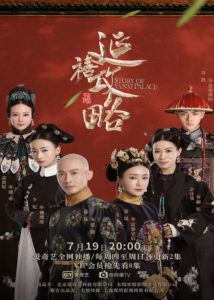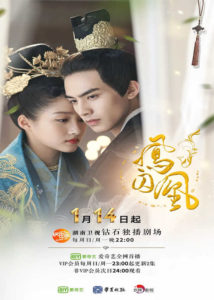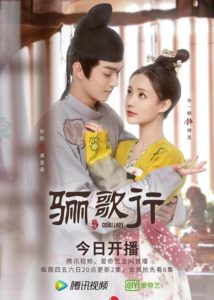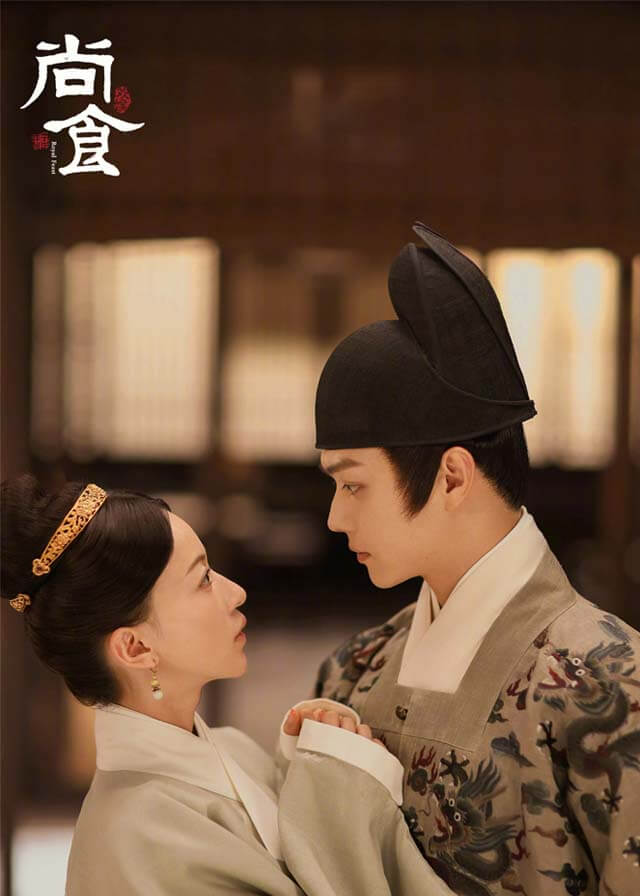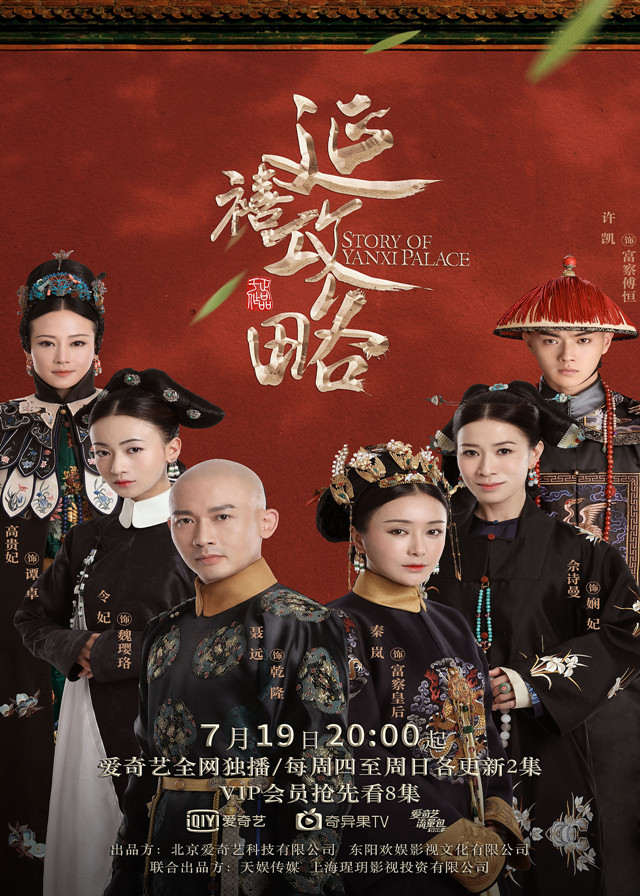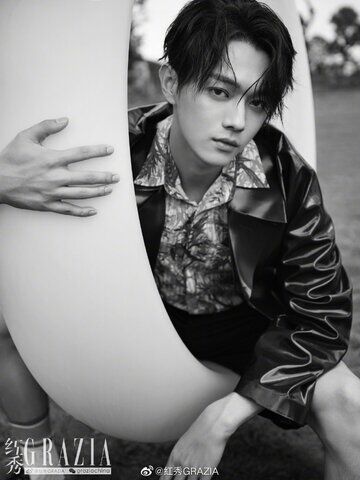Royal Feast Episode 25 Recap
> Royal Feast Recap
Zhu Zhanji and Yao Zijin joined the Emperor for a meal. Yao Zijin assisted Zhu Zhanji as he personally grilled meat skewers for his father. Understanding the Emperor's constitution, she cleverly substituted regular oil with milk ghee for the kebabs. She explained that milk ghee would ensure the first bite was crispy, unlike over-grilled meat. Zhu Zhanji recounted a childhood memory of his first hunt, where he had charred the mutton he roasted for his father.
The Emperor reminisced about the incident, his mood visibly softening. Soon after, Su Si Shan arrived to deliver more dishes and questioned Yao Zijin about serving greasy roasted meat, recalling the Emperor's past toothaches. Yao Zijin calmly explained that she had incorporated a small amount of thyme powder into the seasoning to counter the heat and greasiness, enhancing the flavor.
She added that the Emperor was also drinking chrysanthemum tea, which, when paired correctly with roasted meat, could help in resisting cold and warming the stomach. She pointed out that roasted meat had also been served at a previous banquet by Su Si Shan herself and Hu Shang Shi. Yao Zijin then presented a "Roasted Flower Takes Mandarin Fish" dish, meticulously prepared with winter bamboo shoots, mushrooms, sea cucumber, scallops, and pork, wrapped in a net of oil and dough.
She explained that despite being roasted, the fish was fresh, not greasy, fragrant, and beneficial for the heart and lungs. The Emperor praised its auspicious name. Zhu Zhanji, feeling unwell from practicing sword in the wind, excused himself and returned to his study. Concerned for his son, the Emperor, accompanied by the Empress, followed.
In the study, as Zhu Zhanji attended to his wound, Yao Zijin offered an insightful analysis of the Emperor's past actions and his complex relationship with Zhu Zhanji, explaining that the late Emperor's favor towards Zhu Zhanji might have inadvertently fostered a lack of filial awe in the Crown Prince.
She referenced a poem written by the Emperor himself when he was Crown Prince, which on the surface was about chess but subtly conveyed his grand vision for a peaceful and prosperous reign. Yao Zijin elaborated on the Emperor’s wise rule since his ascension, including halting lavish imperial purchases, issuing numerous tax relief edicts, lightening burdens on the people, and promoting righteous governance and open discourse.
She praised him as a benevolent and wise ruler whose merits would endure for generations. The Emperor and Empress arrived, expressing concern for Zhu Zhanji’s injury. Yao Zijin, despite her apprehension, was encouraged by the Emperor to speak her mind freely. She then humbly stated that while the Emperor’s reign was widely lauded, there was one matter of concern she had heard discussed among the common folk.
She revealed the public’s sympathy for the innocent wives and daughters of officials from the Jianwen Dynasty, who, despite the Emperor's general amnesty for criminals, remained implicated, forced into servitude, or exiled, suffering greatly. The Emperor, moved by Yao Zijin's frankness, remarked that few dared to speak such truths. Identifying herself as a "Dian Shan" of the Shangshi Bureau, Yao Zijin was immediately promoted to "Si Shan."
The Emperor then suggested she recuperate and go to Nanjing after her injury healed. Later, the Emperor discussed the fate of these implicated women with the Empress, questioning if pardoning them would go against his predecessor's decree. The Empress, citing "Emperor Mingzu's training," argued that extra-legal punishments were meant as warnings, not regular practice for stable reigns, and that true adherence to ancestral precepts meant showing compassion to the innocent.
Convinced, the Emperor decreed that all surviving female relatives of the Jianwen treacherous officials, who had been enslaved or exiled, be granted commoner status and provided with land. Yao Zijin later found herself in a private conversation with Zhu Zhanji, who revealed that he had been aware of her strategic use of his presence to advocate for the exiled women, and that her seemingly clumsy demeanor was part of a calculated plan.
Yao Zijin admitted her intentions, expressing her empathy for the women whose plight mirrored that of her own mother. She acknowledged that her actions had also benefited Zhu Zhanji by preventing his immediate departure to Nanjing. Zhu Zhanji, while calling her a "fox" for her cunning, also admitted his own attempt to test her true feelings when he previously offered to let her leave the palace. Later, the Empress summoned Yao Zijin for a medical examination by Jiang Siyao.
Jiang Siyao confirmed that Yao Zijin's right hand was recovering well and would be fine as long as she avoided strenuous cooking tasks, though she was somewhat stressed from overwork and prescribed Yueju pills. After the examination, Jiang Siyao congratulated Yao Zijin, much to her confusion.
At that moment, Mrs. Peng Chengbo, Yao Zijin’s grandmother, burst in, declaring that her granddaughter, whom she called "Ali," was to be conferred the title of Tai Sun Pin, and demanded the finest accessories be prepared for her. Yao Zijin quickly sought refuge in Zhu Zhanji's study to avoid her grandmother.
Mrs. Peng Chengbo pursued, causing a commotion, but Zhu Zhanji cleverly deflected her by presenting a cat he had named "Inkstone," implying it was the "Ali" she sought, and had her escorted away. Yao Zijin explained to Zhu Zhanji that her grandmother had tirelessly sought medical help and saved her life when she was gravely ill as a child, creating a profound sense of indebtedness.
Yao Zijin then confessed her desire to become the Head of the Imperial Kitchen, Shang Shi. Zhu Zhanji initially scoffed at her ambition, highlighting the decades it took Meng Shang Shi to achieve that rank. However, witnessing her resolve, Zhu Zhanji decided to support her, announcing his intention to help her fulfill all her wishes, and headed with her to Kunning Palace. Meanwhile, the investigation into the Upper Lantern Festival assassination progressed.
You Yifan presented his findings to the Emperor, defending Zhu Zhanji by pointing out the illogical nature of the crime if the Crown Prince were truly behind it. Zhu Zhanji arrived and confirmed that the craftsman responsible for setting the gunpowder on the Ao Mountain lantern had been killed the night of the celebration and had gone unnoticed due to the Emperor's subsequent clemency towards the innocent craftsmen.
He further revealed that the master of one of the assassins involved had been closely associated with Han Wang a decade prior, linking the assassination to Han Wang's faction. You Yifan advised Zhu Zhanji to remain in the capital and focus on his recovery due to concerns about a possible diversionary tactic. The lingering issue of the assassination troubled the Emperor, who hesitated to act decisively against Han Wang due to their fraternal bond.
Later, Purple Azolla, a palace maid, presented seasonal delicacies and numerous chrysanthemums to the Emperor, much to his delight, earning her many rewards. Yuehua, observing this, expressed her disdain for Purple Azolla, considering her clumsy and ignorant of medicinal principles, believing her popularity with the Emperor would be fleeting. Stung by Yuehua’s taunts, Purple Azolla resolved to prove her worth by preparing an Eight Treasures Cake and sought Yao Zijin's help.
The following day, after consuming a piece of the cake, the Emperor suddenly fainted. The Emperor's collapse was a grave matter, especially after eating the Eight Treasures Cake. Although imperial doctors found no poison, the Crown Princess seized the opportunity to accuse Purple Azolla and Yao Zijin, claiming they had used an excessive amount of tonic ingredients in the cake.
Purple Azolla admitted to making the cake, detailing the ingredients used for both the folk and court versions, the latter requiring Codonopsis pilosula and velvet antler as per Tai Hospital's prescription. The Crown Princess vehemently argued that the Emperor's daily medicinal diet already contained sufficient tonics like Ganoderma lucidum, velvet antler, and ginseng, and that ignorant chefs should not meddle with medicated diets.
She insisted that over-supplementation could harm the Emperor's weak spleen and stomach, especially excessive velvet antler, which could cause vomiting and fainting in frail individuals. She demanded severe punishment for those who had flattered the Emperor at the expense of his health. Yao Zijin, kneeling, explained that while the Emperor enjoyed rich foods, his spleen and stomach were often imbalanced. Imperial doctors, in their efforts to tonify him, frequently prescribed large amounts of potent supplements.
She acknowledged that excessive supplements could be harmful but clarified that all medicated diet prescriptions and dosages were determined by the Tai Hospital and supervised due to the value of the ingredients. She then revealed that knowing the potential for overdose from the Tai Hospital's prescriptions, she had subtly over-simmered the ginseng to a charcoal state and secretly added raw radish juice to the dough.
She explained that raw radish juice was cooling, cleared phlegm, detoxified, and could mitigate the strong medicinal properties of the tonics, also aiding digestion. She asserted that the Eight Treasures Cake was harmless and not the cause of the Emperor's ailment. The Crown Princess then accused her of deliberately concealing her knowledge of the Tai Hospital's flawed prescription. The Emperor, having regained consciousness, questioned why she had hidden the truth.
Yao Zijin explained that the original recipe wasn't inherently wrong, but the Emperor's firm belief in ginseng and velvet antler's efficacy, combined with the doctors' reluctance to contradict him, led to the risk of overdose. She chose to subtly balance the potent tonics with radish to prevent qi stagnation and illness, fearing that a direct report would cause misunderstandings and implicate many medical staff.
Impressed by her resourcefulness and compassion, the Emperor praised her skills as a cook who not only created exquisite dishes but also understood human nature and managed affairs with such discipline, deeming her current rank of Si Shan too low. Both the Emperor and Empress then considered conferring upon her the title of Tai Sun Pin.





